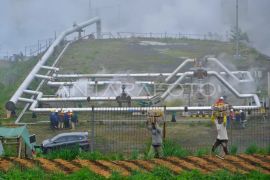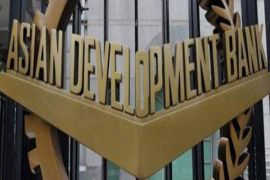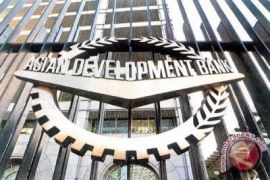Although Indonesia has a strong macroeconomic foundation, the ongoing COVID-19 outbreak has changed the direction of the country's economy, with deteriorating external environmental conditions and weakening domestic demandJakarta (ANTARA) - The latest Asian Development Bank (ADB) report projects that Indonesia’s economy will slow down or only record a growth of some 2.5 percent in 2020, down from five percent in 2019 over the COVID-19 pandemic.
"Although Indonesia has a strong macroeconomic foundation, the ongoing COVID-19 outbreak has changed the direction of the country's economy, with deteriorating external environmental conditions and weakening domestic demand," ADB Director for Indonesia Winfried Wicklein noted in a statement in Jakarta on Friday.
Wicklein remarked that if firm action can be taken effectively to address the health and economic impacts, particularly to protect the poor and vulnerable, the Indonesian economy is expected to gradually return to its growth path of some five percent by 2021.
According to the 2020 Asian Development Outlook (ADO) Report, the COVID-19 pandemic, along with the plummeting commodity prices and financial market turmoil, will have dire implications for the world economy and Indonesia this year, especially with the deteriorating economy of several major trading partners.
Domestic demand is expected to weaken in line with declining business and consumer sentiment. However, in tune with the recovery of the world economy next year, Indonesia's growth is projected to gain momentum, bolstered by reforms in the investment sector.
The inflation rate is expected to edge up to three percent in 2020, before plunging again to 2.8 percent in 2021. Inflationary pressures stemming from tight food supplies and currency depreciation are expected to be partially offset by lower non-subsidized fuel prices and additional subsidies for electricity and food.
Meanwhile, export earnings from the tourism and commodity sectors are expected to decline, causing a current account deficit of 2.9 percent of the gross domestic product in 2020. As exports and investment performance recover in 2021, a greater volume of imported capital goods will cause a transaction deficit running the same as 2020.
ADB also noted that the government and financial authorities had launched various coordinated and targeted fiscal and monetary measures to mitigate the impact of the COVID-19 pandemic on the economy and people's livelihoods.
Various stimulus measures to reduce the uncertainty encompass the disbursement of direct cash assistance to the poor and vulnerable groups as well as income tax cuts and the leniency of loan payments for workers and businesses.
However, externally, the risks to Indonesia's economic projections for 2020 and 2021 are a prolonged outbreak of COVID-19, a further drop in commodity prices, and heightened financial market turmoil.
On the domestic side, this projection also depends on how swiftly and effectively the outbreak can be overcome, as health system limitations and difficulties in applying social restrictions can exacerbate the impact of the pandemic on the economy. Related news: Indrawati forecasts COVID-19 pandemic to dampen economic growth
Related news: Slowdown to hurt household, MSME, corporate, financial sectors most
Reporter: Satyagraha, Azis K
Editor: Rahmad Nasution
Copyright © ANTARA 2020








